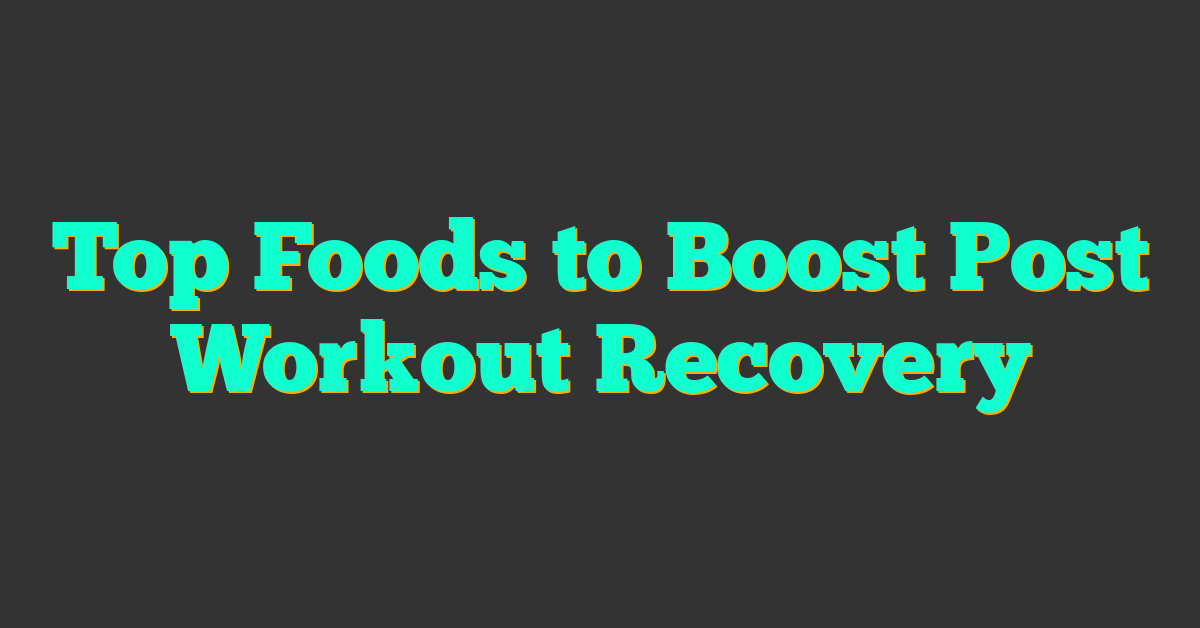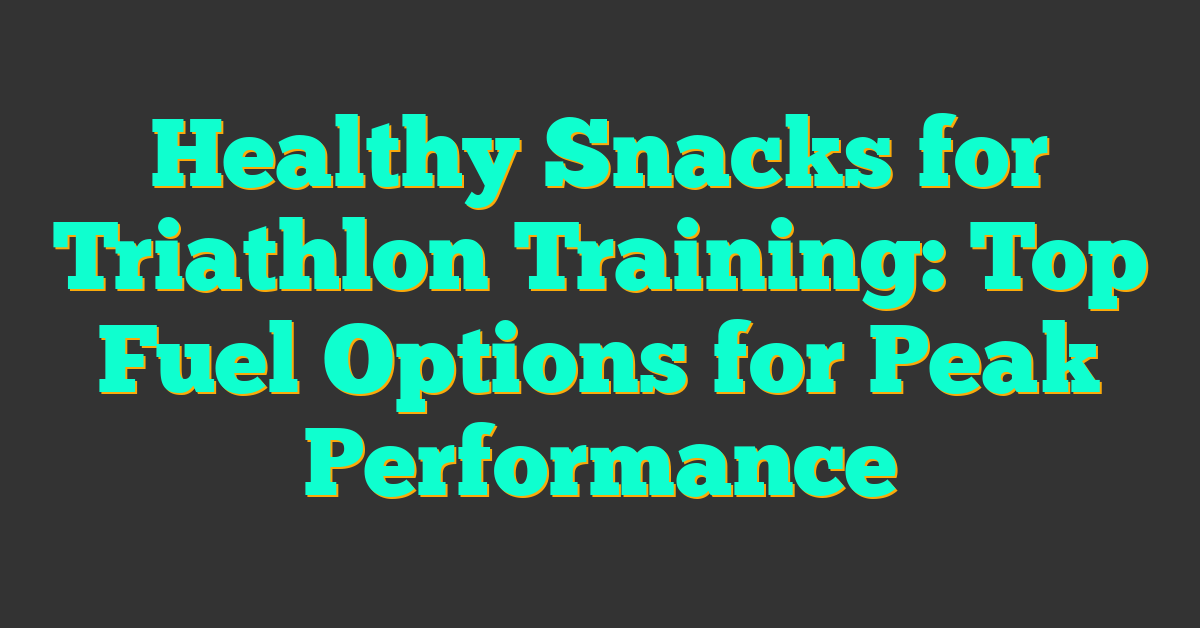After a strenuous workout, your body needs the right nutrients to recover and rebuild muscle tissue. Eating the right foods post-workout can help you optimize recovery and get the most out of your exercise routine. In this article, we’ll explore the top foods that can help boost post-workout recovery and provide comprehensive nutrition for your body.

Protein is essential for muscle growth and repair, making it a crucial nutrient for post-workout recovery. Incorporating protein-packed foods into your post-workout meal can help your muscles recover faster and more efficiently. In addition to protein, carbohydrates are also important for replenishing energy stores and providing fuel for your next workout. Fats also play a role in recovery, as they help to reduce inflammation and support overall health.
To ensure that your body is getting the comprehensive nutrition it needs for optimal recovery, it’s important to also include vitamins and minerals in your post-workout meal. These nutrients help to support overall health and wellbeing, and can help to speed up the recovery process. In the following sections, we’ll explore the top foods that can help you optimize post-workout recovery and get the most out of your exercise routine.
Key Takeaways
- Eating the right foods post-workout can help you optimize recovery and get the most out of your exercise routine.
- Incorporating protein-packed foods, carbohydrates, and healthy fats into your post-workout meal can help your muscles recover faster and more efficiently.
- To ensure comprehensive nutrition, it’s important to also include vitamins and minerals in your post-workout meal.
Optimizing Post-Workout Recovery
https://www.youtube.com/watch?v=xjkwxG1YJZ4&embed=true

If you’re looking to maximize your gains from your workouts, optimizing your post-workout recovery is essential. Here are some key factors to keep in mind to help you recover quickly and effectively.
Importance of Muscle Repair
When you exercise, you’re essentially breaking down your muscle fibers. In order to build muscle and get stronger, your body needs to repair and rebuild those fibers. That’s why muscle repair is such an important part of post-workout recovery.
One way to support muscle repair is to make sure you’re getting enough protein in your diet. Protein provides the building blocks your body needs to repair and rebuild muscle fibers. Good sources of protein include lean meats, fish, eggs, and plant-based sources like beans and lentils.
Role of Hydration in Recovery
Hydration is another key factor in post-workout recovery. When you exercise, you lose water through sweat, and it’s important to replace that lost fluid to help your body recover. Water also helps to transport nutrients throughout your body, which is important for muscle repair.
Make sure you’re drinking enough water throughout the day, not just during and after your workouts. A good rule of thumb is to aim for at least 8 glasses of water per day, but you may need more if you’re very active or live in a hot climate.
Understanding Macronutrients
In addition to protein, your body needs other nutrients to support post-workout recovery. Carbohydrates provide energy for your workouts and help to replenish glycogen stores in your muscles after exercise. Good sources of carbohydrates include fruits, vegetables, and whole grains.
Healthy fats are also important for recovery, as they help to reduce inflammation in your body. Good sources of healthy fats include nuts, seeds, avocados, and fatty fish like salmon.
By paying attention to these key factors, you can help to optimize your post-workout recovery and get the most out of your workouts.
Protein-Packed Foods for Muscle Growth
https://www.youtube.com/watch?v=2Ni4Q7NOMkM&embed=true
After a workout, your body needs protein to repair and build muscle tissue. Including protein-packed foods in your post-workout meal can help boost muscle growth and recovery. Here are some animal and plant-based protein options to consider:
Animal-Based Proteins
Animal-based proteins are complete proteins, meaning they contain all nine essential amino acids that your body needs to build muscle. Here are some options:
- Eggs: Eggs are a great source of protein and contain other nutrients like choline, which can help reduce inflammation and support muscle recovery.
- Greek Yogurt: Greek yogurt is high in protein and contains probiotics, which can help improve gut health and nutrient absorption.
- Cottage Cheese: Cottage cheese is a slow-digesting protein, which means it can provide your body with a steady supply of amino acids for muscle repair and growth.
- Chicken: Chicken is a lean source of protein and contains essential amino acids like leucine, which can help stimulate muscle protein synthesis.
- Fish: Fish like salmon and tuna are high in protein and contain omega-3 fatty acids, which can help reduce inflammation and support muscle recovery.
Plant-Based Proteins
Plant-based proteins are incomplete proteins, meaning they lack one or more essential amino acids. However, by combining different plant-based protein sources, you can still get all the essential amino acids your body needs. Here are some options:
- Quinoa: Quinoa is a complete protein and also contains fiber, which can help improve digestion and nutrient absorption.
- Lentils: Lentils are a good source of protein and also contain iron, which can help support muscle function.
- Chickpeas: Chickpeas are a versatile protein source and can be used to make hummus, salads, and other dishes.
- Whey Protein: Whey protein is a popular supplement for athletes and can be added to smoothies or other post-workout meals to boost protein intake.
- Plant-Based Protein Powder: Plant-based protein powders, such as pea, soy, or rice protein, can be used as a substitute for whey protein and are a good option for those who follow a vegan or vegetarian diet.
Including protein-packed foods in your post-workout meal can help support muscle growth and recovery. Whether you prefer animal or plant-based protein sources, there are plenty of options to choose from.
Carbohydrates to Replenish Energy Stores
https://www.youtube.com/watch?v=otSoOaXSN-0&embed=true
After a strenuous workout, your body needs to replenish its depleted energy stores. Carbohydrates are an essential nutrient that provides energy to your body. They are stored in your muscles and liver as glycogen, which is used to fuel your workouts. Consuming carbohydrates after your workout can help replenish your glycogen stores and provide the energy your body needs to recover.
Simple Carbs for Immediate Energy
Simple carbohydrates are broken down quickly by your body and provide an immediate source of energy. They are ideal for replenishing your energy stores immediately after your workout. Some of the best sources of simple carbohydrates include fruits like bananas, grapes, and oranges. These fruits are rich in natural sugars that are easily digested by your body. Other sources of simple carbohydrates include honey, maple syrup, and table sugar.
Complex Carbs for Sustained Release
Complex carbohydrates take longer to digest and provide a sustained release of energy. They are ideal for replenishing your energy stores over a longer period of time. Some of the best sources of complex carbohydrates include sweet potatoes, grains like brown rice and quinoa, and fruits like apples and pears. These foods are also rich in fiber, which helps to slow down the digestion of carbohydrates and provide a sustained release of energy.
Including a mix of simple and complex carbohydrates in your post-workout meal can help to replenish your energy stores and provide the energy your body needs to recover. Try adding a banana to your post-workout smoothie or having a sweet potato with your post-workout meal to get the benefits of both simple and complex carbohydrates.
Fats and Their Role in Recovery
« Save $9,000: Top 22 Hidden Triathlon Expenses and How to Cut Costs
Top Triathlon Wheels for Your Next Race »

When it comes to post-workout recovery, fats play an important role in reducing inflammation and aiding muscle repair. However, not all fats are created equal. Here are some healthy fats that you should include in your post-workout meal plan.
Healthy Fats for Inflammation Reduction
Inflammation is a natural response to exercise-induced muscle damage. However, chronic inflammation can hinder muscle repair and delay recovery. Including healthy fats in your diet can help reduce inflammation and speed up recovery.
Nuts: Nuts such as almonds, walnuts, and pistachios are rich in monounsaturated fats, which have been shown to reduce inflammation. They are also a good source of vitamin E, which has antioxidant properties and can help protect against exercise-induced oxidative stress.
Avocado: Avocado is a great source of monounsaturated fats and has been shown to reduce inflammation and improve heart health. It is also rich in potassium, which can help replenish electrolytes lost during exercise.
Omega-3s and Muscle Soreness
Omega-3 fatty acids are a type of polyunsaturated fat that have been shown to reduce muscle soreness and inflammation. Here are some sources of omega-3s that you can include in your post-workout meal plan.
Salmon: Salmon is a great source of omega-3 fatty acids, which have been shown to reduce muscle soreness and inflammation. It is also a good source of protein, which is essential for muscle repair and growth.
Chia Seeds: Chia seeds are a great source of omega-3 fatty acids and can be easily added to your post-workout smoothie or yogurt bowl. They are also high in fiber, which can help regulate digestion and keep you feeling full.
Including healthy fats in your post-workout meal plan can help reduce inflammation, aid muscle repair, and speed up recovery. Be sure to include a variety of healthy fats in your diet to reap the full benefits.
Vitamins and Minerals for Comprehensive Nutrition

After a strenuous workout, your body needs a lot of nutrients to repair the damage and recover properly. Vitamins and minerals are essential for overall health and wellbeing, but they are especially important for post-workout recovery. Here are some of the key vitamins and minerals you should include in your diet to promote muscle growth and repair.
Electrolytes for Muscle Function
Electrolytes are minerals that carry an electrical charge and are essential for muscle function. When you sweat during a workout, you lose electrolytes, which can lead to muscle cramps and fatigue. To replenish your electrolytes, you should consume foods that are rich in potassium, calcium, and magnesium. Some of the best sources of electrolytes include:
- Bananas
- Spinach
- Sweet potatoes
- Avocado
- Watermelon
Antioxidant-Rich Foods for Damage Repair
During a workout, your body produces free radicals, which can cause damage to your cells and tissues. Antioxidants are compounds that neutralize free radicals and prevent them from causing damage. To promote post-workout recovery, you should consume foods that are rich in antioxidants, such as:
- Berries (blueberries, raspberries, strawberries)
- Spinach
- Kale
- Watermelon
- Dark chocolate
Including these foods in your diet can help your body recover faster and more efficiently after a workout. Additionally, consuming a diet full of nutrient-dense, colorful foods, lean proteins, healthy fats, and whole grains can provide you with the vitamins and minerals your body needs to build muscle and stay healthy.
Frequently Asked Questions

What are the top foods to alleviate muscle pain after exercising?
Muscle pain and soreness after exercise can be alleviated by consuming foods that are rich in protein and anti-inflammatory properties. Some of the top foods that can help alleviate muscle pain include salmon, eggs, sweet potatoes, spinach, and blueberries. These foods contain essential nutrients that aid in reducing inflammation, repairing muscle tissue, and promoting muscle growth.
Which fruits are most beneficial for muscle recovery?
Fruits are an excellent source of antioxidants, vitamins, and minerals that are essential for muscle recovery. Some of the most beneficial fruits for muscle recovery include bananas, cherries, watermelon, and kiwi. These fruits contain a high amount of potassium, which helps to regulate muscle contractions and reduce muscle soreness.
What should I drink post-exercise to aid muscle recovery?
Drinking enough fluids after exercise is crucial for muscle recovery. Water is the best option for hydration, but you can also drink other fluids that contain essential electrolytes such as sodium and potassium. Some of the best post-exercise drinks include coconut water, chocolate milk, and tart cherry juice. These drinks provide essential nutrients that aid in muscle recovery.
How can I tailor my post-workout meal for optimal muscle gain?
To tailor your post-workout meal for optimal muscle gain, you should focus on consuming foods that are rich in protein and carbohydrates. Protein is essential for muscle repair and growth, while carbohydrates help to replenish glycogen stores that are depleted during exercise. Some of the best post-workout meals for muscle gain include grilled chicken with sweet potatoes, brown rice with lean beef, or a protein shake with fruits and nuts.
What are the best snacks to consume after a workout for quick recovery?
Snacks that are rich in protein and carbohydrates are the best options for quick recovery after a workout. Some of the best snacks to consume after a workout include Greek yogurt with fruits and nuts, a protein bar, or a peanut butter and banana sandwich. These snacks provide essential nutrients that aid in muscle recovery and replenish energy stores.
Which foods should I avoid to prevent hindering muscle recovery post-workout?
To prevent hindering muscle recovery post-workout, you should avoid consuming foods that are high in sugar, unhealthy fats, and processed ingredients. These foods can increase inflammation, slow down muscle recovery, and hinder muscle growth. Some of the foods to avoid include fast food, sugary drinks, candy, and fried foods.





![Lamicall Bike Frame Bag Waterproof - [1s Release] [2 in](https://m.media-amazon.com/images/I/41WyOmmNsYL._SL500_.jpg)




